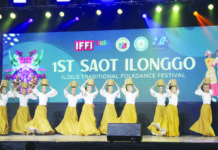
BY HERMAN M. LAGON
PAUSING to understand and empathize with those around us is as elusive as spotting a unicorn in your backyard. Yet, the rich tapestry of the Ilonggo lexicon offers a beautiful gem: “pinanilagan”. It is a gentle reminder, nudging us towards empathy, discretion, and genuine respect for the emotions and dignity of our peers.
Imagine this: you are in a public space, perhaps a plane, train, bus, jeepney, restaurant, library, movie house, elevator, restaurant, or a café, seeking peace amid the day’s rush. Suddenly, someone nearby chats on their phone with the gusto of a cockfighting barker. It is during such instances that we are reminded that the essence of “pinanilagan” is more than just a cultural term — it is a lifestyle choice, emphasizing consideration for the shared spaces and sentiments of others.
The essence of “pinanilagan” is not just silencing your phone if it suddenly rings but also being aware of how your actions — like laughing loudly or discussing plots — might impact someone’s tranquil reading, listening, viewing, or traveling experience. It is about weaving a tapestry of mutual respect, even in the silences between the pages, plots, and trips.
At its heart, “pinanilagan” is about understanding. Evolving from its original definition — “what has been well-watched or observed” — it is a call to walk a mile in someone else’s shoes. Picture an elderly person on a busy bus, teetering as they search for a seat. Channeling “pinanilagan” would mean offering your seat, not out of obligation or hollow chivalry, but from a genuine place of understanding their need.
But there is more! “Pinanilagan” also encourages self-reflection and wise decision-making. Think of self-awareness as a friendly tap on the shoulder, gently pointing out when we might be straying from our best selves. We all have our moments. Recognizing them is the first step toward personal growth and embodying the spirit of “pinanilagan”.
Discernment, meanwhile, is that voice of reason guiding us through social mazes. Picture being on a flight, bus, meeting, or during Mass and receiving a crucial call. Embracing “pinanilagan” might mean keeping your voice low or stepping into the aisle or somewhere private, ensuring everyone’s experience remains undisturbed.
There is a shared anticipation as the lights dim in a theater, or the curtain readies to rise on a play. Whether it is a concert’s energy, the play’s intensity, or the significance of graduation, each moment binds us with common expectations. Embodying “pinanilagan” means valuing these shared spaces: silencing ourselves as a concert starts, limiting oneself from loitering around the performances, or keeping our thoughts quiet and dimming our gadgets during an intense movie. It is about recognizing the collective experience and ensuring everyone enjoys the moment to its fullest. In short, it is about enhancing moments, mindful of the ripples our actions send.
Consider this: In a bustling office, Jane tirelessly works on a challenging project. Many see her as just another worker, but her fatigue is evident. While easy to overlook amidst personal tasks, “pinanilagan” urges us to notice and offer support. In light of the unnoticed stresses, a simple gesture of understanding or help can make a profound difference.
“Pinanilagan” goes beyond mere actions; it is embedded in the details of our daily lives. Consider our digital world, where social media platforms and group chats abound. We have all encountered that one friend who eagerly overshares every moment, every meal, every sunset they have witnessed. While sharing is the essence of these platforms, “pinanilagan” encourages restraint. It is thinking twice before posting a group photo from a private gathering or refraining from live-tweeting a personal conversation. In a digital age where boundaries are often blurred, it is the art of discerning what to share and what to hold close, a plane many of us have so much to work on.
Consider workplaces, too. We have all been part of meetings where discussions can get heated, where differing opinions might clash. “Pinanilagan” in such settings is the subtle art of active listening. It is having more patience to give your colleague the floor without interruption, even if you are itching to counter their point. It is about ensuring everyone feels seen and heard, fostering a sense of mutual respect and belonging.
Family gatherings offer another vivid canvas for “pinanilagan”. The web of a family is woven with diverse threads, each member having their own stories, victories, and challenges. At a reunion, an aunt might prod about marital status or career choices, meaning well but possibly straying into sensitive territory. Channeling “pinanilagan” here is to steer the conversation with grace, perhaps sharing a happy memory or asking about her own experiences, ensuring no one feels cornered or uncomfortable.
In the daily noise of life, “pinanilagan” also calls us to empathize with global adversities often glimpsed in the news. While it is easy to dismiss sufferings from distant lands, embodying “pinanilagan” urges acknowledgment of our shared humanity, transcending borders. This insight might not drive grand actions, but it prompts simple gestures like raising awareness, supporting global causes, promoting social advocacies, and showcasing solidarity for those in need beyond our immediate realm.
To add a last touch of real-world flair, consider holding a door open for someone, offering a smile, lending a hand, or sincerely uttering words like “please”, “thank you”, “you’re welcome”, “sorry”, “excuse me”, “no worries”, “hi”, “hello”, “good morning”, or “how are you?” While these gestures may seem minor, they embody the essence of “pinanilagan”. Such actions are gentle reminders of a time when respect was the primary currency and shared spaces were deeply cherished.
In all these facets of life, “pinanilagan” serves as a compass, directing us towards kindness, respect, and a shared understanding. It is a timeless principle, urging us to build bridges of compassion in a world bustling with myriad narratives./PN







